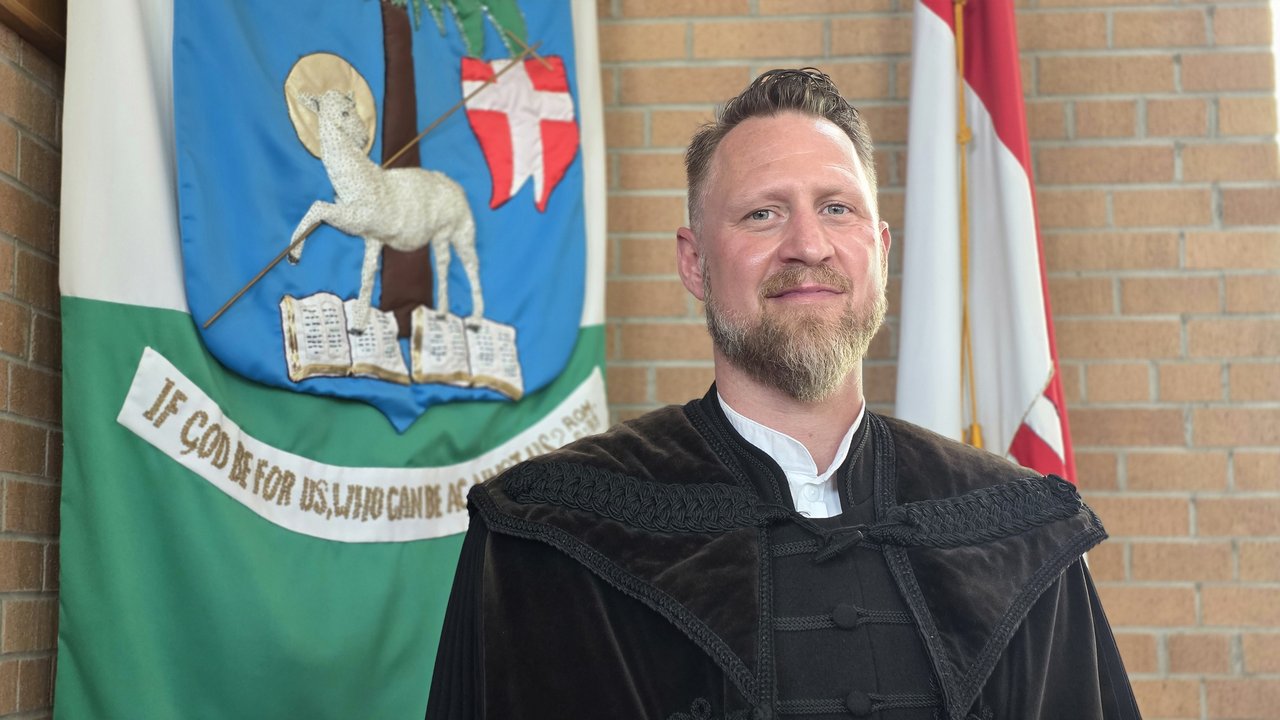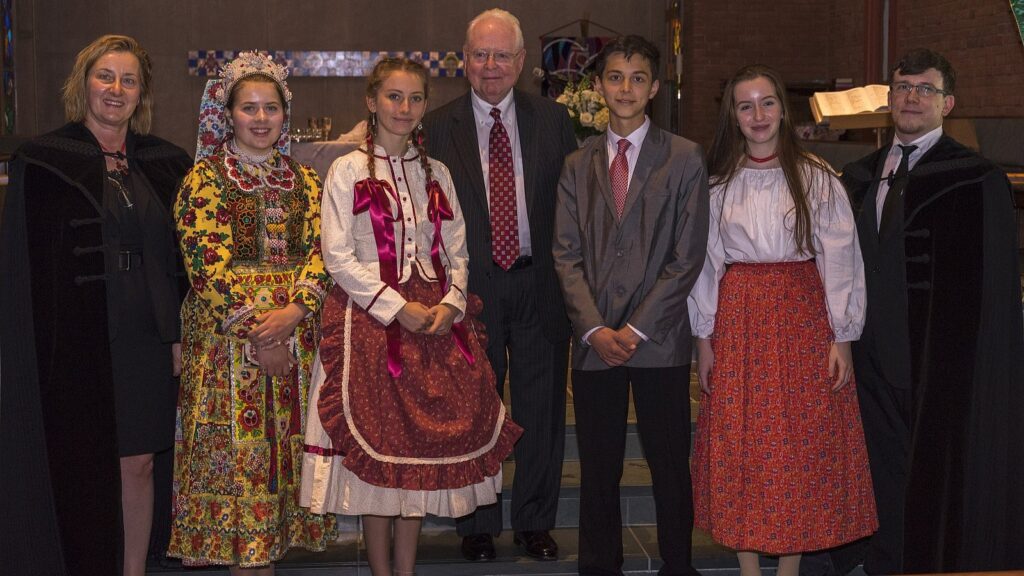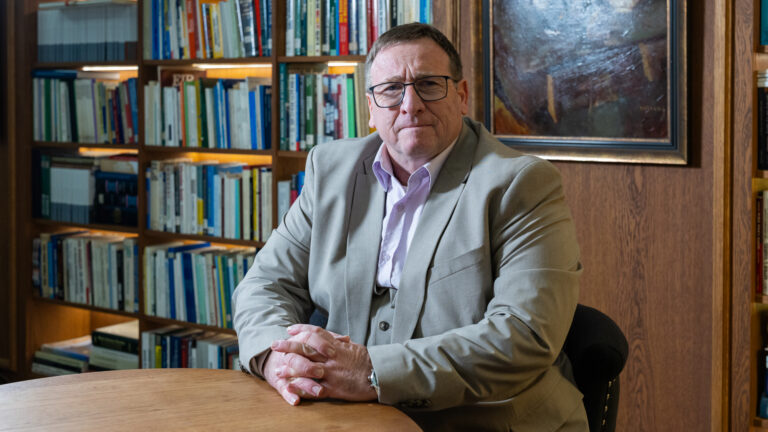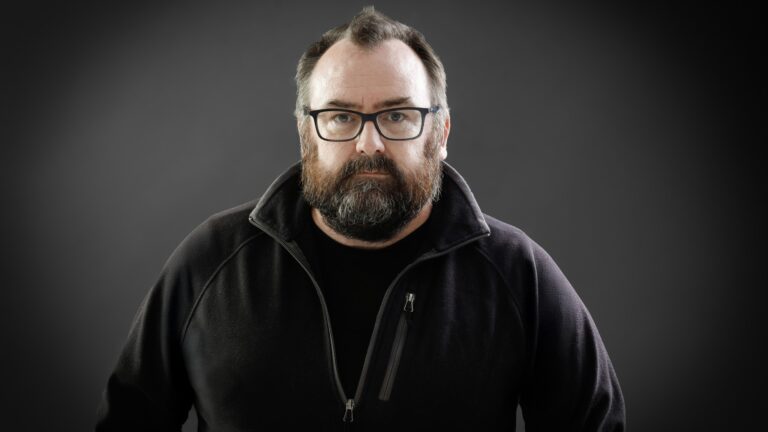This is an abridged translation of the original interview, published online on reformatus.hu on 24 June 2025.
The Detroit-based Hungarian reformed pastor, László Csákai, already had a reputation before he arrived there—word had spread from chief elder Aunt Ilonka Maksai, even during the time when the congregation operating in Allen Park, MI, had been without a pastor for two years. I asked him about his career choice, his previous ministries, and his impressions of his first months in America.
***
You grew up in a pastoral family. Was choosing the ministry obvious?
In Kunszentmiklós, Hungary, my grandparents served as pastors, so I grew up immersed in the life of the congregation. After elementary school, I’d go to them and study with my grandmother, who used to sit in the kitchen and chat with anyone who came by. Meanwhile, my grandfather used to be away burying the dead, visiting the sick, handling affairs—he knew and spoke with everyone.
My parents were presbyters, and my mother, currently a retired kindergarten teacher, was asked to help start and lead the Reformed kindergarten at one point so the youngest members of the congregation could also be integrated. I attended Sándor Baksay Reformed High School. After one of my lectures, my catechist, Aunt Judit, said: ‘Laci, you need to go to theology!’. I applied to four higher education institutions, but was only accepted at the theology faculty and in a teacher-catechist training—it was a clear message from God that ‘I couldn’t run away’.
I chose theology because I thought it would allow me to serve the faith of every generation to the glory of God. In my third year, I sensed strongly that there was no other path. From age 15, I worked to support my studies. I still benefit from that experience—today I can lay tile or pour concrete, if needed. But back then, I earned more as a student than I did as a pastor a bit later—so it wasn’t an easy decision. However, this service isn’t for earthly gain. The current pastoral couple in Kunszentmiklós and another young adult who also became a pastor were all members of my youth group—and before that, my mother’s kindergarten students. I’m proud of them. They confirmed that working with young people is a God-given talent I need to use.
When and where did you begin your service?
At the end of my fifth year, Reverend Gábor Ferenc Szabó invited me to Őrbottyán to lead children’s services. I became a youth-group leader there, and, in my sixth year, an assistant pastor. I also spent time at a local care home for people with disabilities, playing guitar for them. After nine months, I was assigned as an assistant diocesan pastor in Tab. It was deep water—with Archdeacon Csaba Nagy, we served seven mother congregations and eight missions. I drove 60,000 kilometers in a year; around Christmas–New Year’s Eve, I held 32 services in 15 days.
After two years and three months, I left to prevent a complete burnout. I had to rebuild many things: regaining congregation members, visiting them, fixing finances, and I was too young for such a large task, though the archdeacon helped a lot. I focused on ministry, but five services a day were exhausting…A friend told me that the community in Szomód (near Tata) was looking for a pastor. I liked this Swabian village of 2,000 inhabitants, including its roughly 300‑member Reformed congregation. After my first service, they held an unofficial vote: out of 56 voters present, 38 voted for me. I moved there in 2011 and served there for 13 years.
Please share some memories from your years in Szomód.
We spent many wonderful years together, holding Bible studies and musical services. We formed a strong presbytery and worked very effectively together. The average age was around 50—excellent for a rural congregation. For church-district level youth camps, I organized at least 25 young people each time from the congregation and the surrounding area. With the introduction of mandatory religious instruction in schools, 130 students attended my classes. I also maintained a mission in Baj: I spent two days a week there, and held Sunday services once every two weeks.
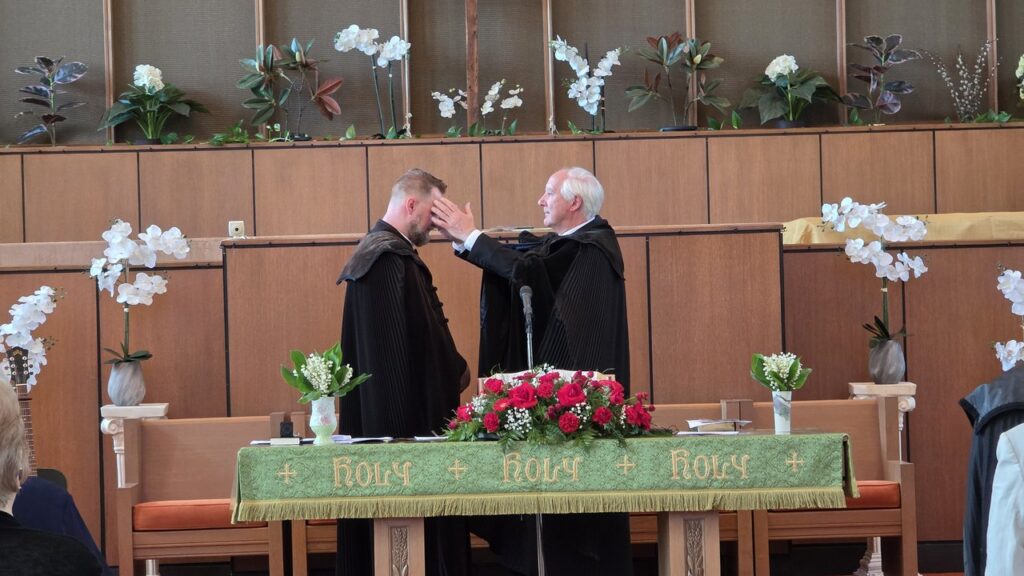
30 to 50 people attended services in Szomód on Sundays, 8 to 15 in Baj. I focused on the Christmas children’s program, which drew around 300 people—including relatives—so we could share the Gospel; several joined the community. After the COVID pandemic, the Baj mission nearly emptied out, but two to three families later joined from there. Every year, I organized a five-day summer camp in the churchyard. 47 children came the first time, eventually growing to 130—spread out in four groups with helper teachers. I also brought older students to a youth camp at Lake Balaton.
In the meantime, we carried out building renovations via grants: by 2014, we restored the 230-year-old parsonage—one of my proudest achievements, being a jewel and heritage of the village and its congregation. The next major project was fixing the dangerously unstable steeple of the church. The grant obtained for this purpose covered less than half the cost, so the chief elder put down one million forints on the offering table, while I offered a smaller amount (100,000 forints), and contractors, nearby congregations, and my family donated, too. In three months, we raised 8 million forints. When a local government representative heard about this initiative, she arranged for the rest of the funding, so by 2022, we completed the beautiful new steeple, another jewel of the church and the village.
We also renovated the Károly Leőke hall. The farm building is nearly collapsing—so there’s still plenty to do…I grew tired. I longed for a congregation where I could ‘just’ care for souls, since preaching, pastoral visits, and religious teaching are demanding tasks alongside family life.
Now let’s talk about your family…
Kitti and I are both in our second marriage. We attended the same high school, then she studied law at Károli University; we belonged to the same group of friends. Unfortunately, both of our first marriages ended. From mine, two sons were born: 16-year-old Bendegúz and ten-year-old Sámuel. Moving to America without them was the hardest decision of my life. At home, they spent three to four days a week with me, and when Kitti and I married, they entered a full, complete family with us.
When I left, I told the congregation that if they chose a pastoral couple, they should think carefully—only one pastor’s salary is covered, and marriage can suffer from the job. We also had other issues that led to divorce. Yet God brings good from the worst: Kitti and I found each other. Since 2023, we’ve been blessed in faith and as a family—now with our son László Béni—and I didn’t dare hope for any of this after the divorce. Though my wife is not a pastor, she immediately formed strong bonds with the congregation. She serves with a huge heart and love—that’s an immense treasure and gift for me.
‘My strength is the Lord, I won’t be destroyed by this hardship’
During my divorce, I received no salary. The congregation supported me, though—they knew I was living alone in a 200 m² parsonage with two young boys who needed to be taken to school and lessons. After five hard months, I rediscovered how to live. After a spiritual retreat, I could finally say: I’m a believer, my strength is the Lord, I won’t be destroyed by this hardship, and I must return to service, because I’m a watchman for my congregation. I understood: no matter how we feel spiritually, if God wants to use us, He will.
Just as your life was settling, you received an opportunity in the U.S…
I could have stayed in Szomód until retirement. But at 40, I needed more motivation and energy…Bishop Zoltán Lizik once asked if I planned to move on. I answered that I had no reason—everything I wanted was there—yet perhaps change would benefit both the congregation and my ministry. He mentioned the Detroit (Allen Park, MI) congregation. In November 2023, Kitti and I came here for ten days to explore. I led two services in English and two in Hungarian. The decision wasn’t easy. I liked the atmosphere and the building complex; I saw potential. But it was clear that the lack of a permanent pastor had hurt the congregation—they were like ‘a flock without a shepherd’. Since then, my primary aim has been to be their spiritual leader—everything else they had managed while pastorless. Some changes were needed, but only cautiously, with love and wisdom.
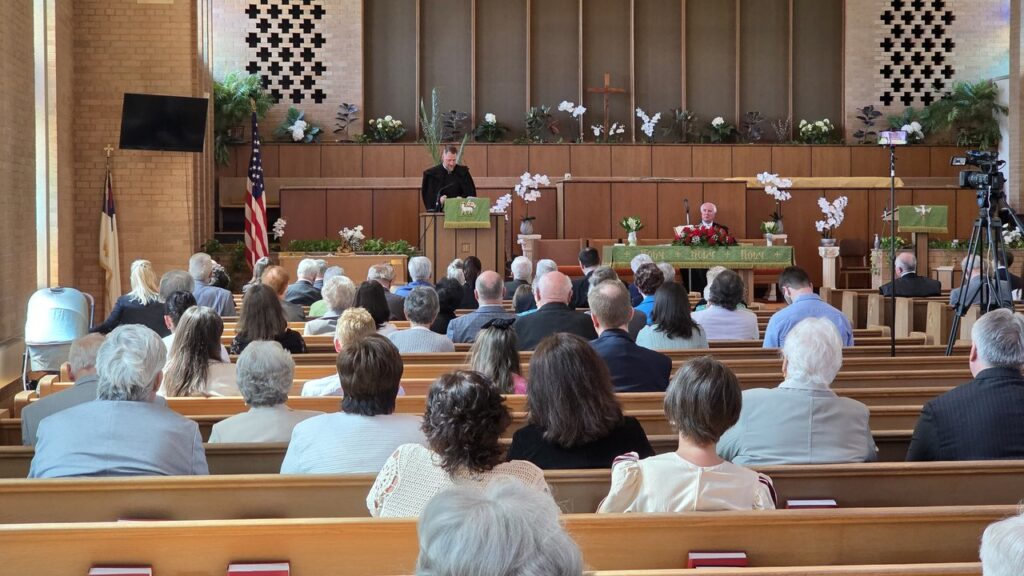
The family side was the hardest part—as mentioned, I have two sons, while Kitti maintained daily contact with her parents and sister. Amid much prayer, we awaited spiritual guidance, and we received it from scripture: Abraham didn’t get a budget before leaving home; God provided everything he needed along the way. Of course, Kitti—as a woman and future mother—calculated more carefully, considering finances like the extremely expensive insurance here. Ultimately, during our visit, we decided to accept the terms they offered.
What did people in Szomód think of your decision?
Our home congregation understood the call and lovingly sent us off. But my sons still struggle—myself included—with their father living on the other side of the ocean. We speak every day and meet whenever we can. I want everyone to know: I didn’t abandon my children; I’m trying to walk the path that each grape of the ‘God, home, family’ cluster is important, and as a pastor, I must care for everyone. I trust that as they grow, it will fall into place in their souls, too.
What congregation welcomed you in Detroit?
In 2024, there were about 100 on the voting registry—it’s small compared to a congregation in Hungary, but here it’s one of the larger ones. English services average ten to 12 people; Hungarian services vary from eight to 40, typically around 25. Most of the Hungarian churchgoers are from Transylvania, usually of older age, but we also have two younger families with small children. We’ve already started preparing for next year’s confirmation, while preparing a 20-year-old lady for this year’s confirmation at Pentecost.
‘I want everyone to know: I didn’t abandon my children’
I’ve been working hard to craft sermons in English, too. At the same time, I’m learning how the congregation functions. Essentially, I’m a Hungarian pastor for a Transylvanian congregation. That means three spheres of challenge at once. I’ve never been a pastor to Transylvanians, though I always wanted to, because I’ve had a lot of contact with congregations there—I understand their hearts, spirits, and thinking, and communicate with them easily. Yet I’m experiencing their stubbornness, which isn’t unique to them, but a characteristic of Calvinists generally. Everywhere church law works a bit differently—and although we could learn from each other, for now it seems I must learn how to translate my usual practices into their Americanized Transylvanian mindset.
Could you give some examples?
I wanted to conduct the service liturgy as I was used to—so that with so many new things I’d at least not have to concentrate on that, and also because the local liturgical practice, in my opinion, isn’t correct. I tried to explain it, but they didn’t understand. So I waited until I got used to their way, and now we change it only slightly to make it liturgically proper. I plan to introduce monthly Bible classes. They said in America it’s not customary to let the pastor into their homes, but that’s part of the pastor’s job, so we’ve started to visit them very intensively. After our baby was born, it became a bit less frequent, but I’ll go on my own as well, once I’m not needed as much at home—this is the foundation of building the congregation.
Additionally, I need to reorganize the office activities. Last time, a message from a seriously ill person’s family didn’t reach me in time, so I couldn’t visit them before that person passed away. They complained about a lack of funds, but were afraid to rent out the hall—I suggested installing cameras for security, and we’ll draft the renting policies too, especially now that a lawyer works alongside the pastor. We need to improve the kitchen for rentals and seek other income sources.
We agreed with the presbytery: Hungarian services will be broadcast live monthly—we only needed a microphone. Every Sunday, I teach them a song on guitar. We discussed everything and will make all changes smoothly.
You mentioned living in the present…
It’s not easy to define, to experience, and to decide why we live in the present rather than the future…It’s hard to attract new members when families have so many other options for the weekend. Not to mention the weather, illness, and huge distances. Still, in four months, we’ve gained back several old friends and some new families. That’s why the scripture ‘hold on to what you have’ echoes in me. I can focus on organizing a youth club or Hungarian school, inviting new families—but what about the current members?! If I invest too much energy in newcomers, I’ll have less time for those I still need to get to know. One of my main tasks, therefore, is to build relationships, go wherever invited—especially places with younger families with Hungarian roots—but most important is keeping our previous events, ensuring existing members attend and grow in spirituality.
How could you integrate into the local Hungarian organizations?
The ecumenical community is united; we have good relations with the Baptist brothers, too. They keep calling me weekly to check on us, and they prayed for our baby’s birth. We have excellent relations with the Pentecostal community as well. Pastors from both communities filled in before we arrived, and we still organize joint events.
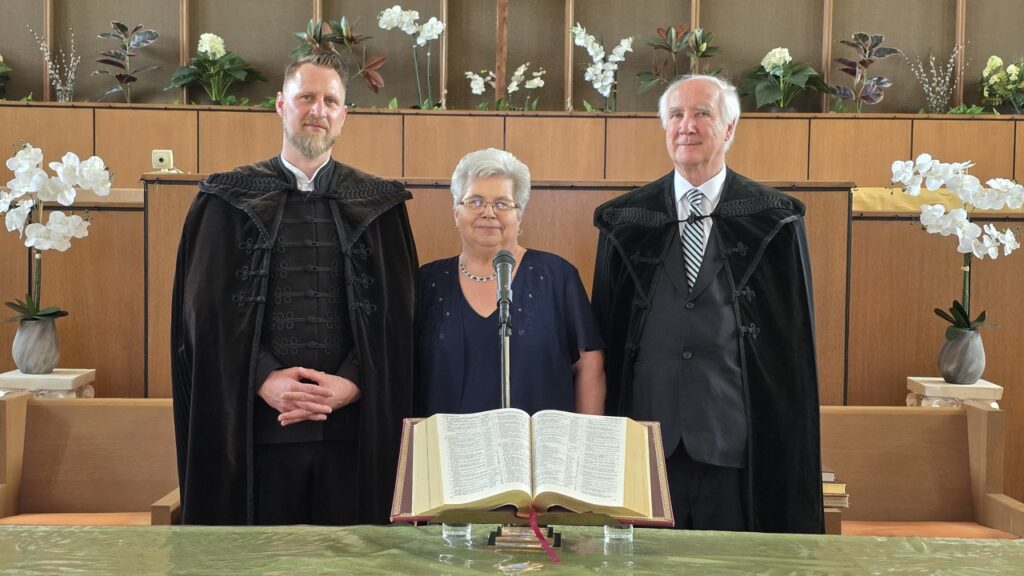
I hope to connect with Catholics, too, though their church is more distant. Among us, there’s also some distance between Transylvanians and Hungarians from Hungary—we must grow in that, too. I trust we all can and will, as members and pastors. The Hungarian Cultural Center invited me to pronounce the blessing on 15 March. I gladly accepted and offered to play Talpra Magyar on guitar.
Anywhere I go, I want to represent the Lord. From everyday tasks like pig-slaughtering and sausage-making to active participation in national holidays—I’m there for whatever serves the community. Additionally, there’s the Circle for Preserving Hungarian Traditions, started by a congregation member in the 1960s—almost as old as our church (founded in 1963). Under the previous pastor, they transitioned to the Cultural Center, but now they’ve returned to hold events in our church. I’d like to get to know them better, even organize film clubs and excursions with them.
And what are your future plans?
I’m listening to internal and higher voices. If I see my children need me more than the congregation, we’ll return home. If I get tired of pastoral ministry while it bears no fruit, I’ll also go, just as if the congregation can’t secure our material needs. Right now, we have minimal provisions. We receive much more in kind and love, but you can’t build a family on that. Kitti shouldn’t have to let go of her work or her talents. Our visa and calling are for two years. After that, we’ll review the fruits of our ministry and how we’ve worked and progressed. The key question is: what is the congregation willing to support so that they can have a pastor?
They are increasingly understanding that we are a nonprofit organization, and that they need to give in order for the congregation to function—and for the pastor to be able to serve with the same passion and energy he came here with, and with which he still shepherds the community—all while feeling that he and his family are secure in their livelihood.
Read more Diaspora interviews:

